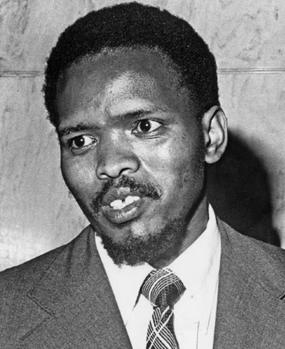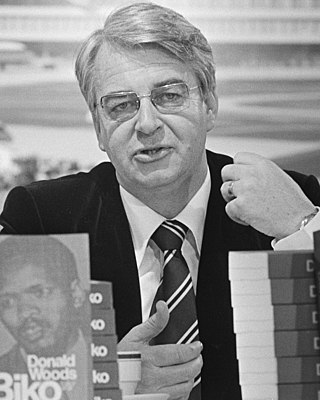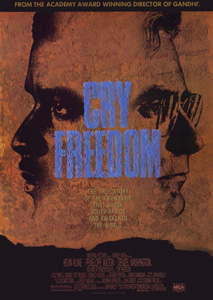
Bantu Stephen Biko OMSG was a South African anti-apartheid activist. Ideologically an African nationalist and African socialist, he was at the forefront of a grassroots anti-apartheid campaign known as the Black Consciousness Movement during the late 1960s and 1970s. His ideas were articulated in a series of articles published under the pseudonym Frank Talk.

Donald James Woods was a South African journalist and anti-apartheid activist. As editor of the Daily Dispatch, he was known for befriending fellow activist Steve Biko, who was killed by police after being detained by the South African government. Woods continued his campaign against apartheid in London, and in 1978 became the first private citizen to address the United Nations Security Council.

Cry Freedom is a 1987 epic apartheid drama film directed and produced by Richard Attenborough, set in late-1970s apartheid-era South Africa. The screenplay was written by John Briley based on a pair of books by journalist Donald Woods. The film centres on the real-life events involving South African activist Steve Biko and his friend Donald Woods, who initially finds him too radical, and attempts to understand his way of life. Denzel Washington stars as Biko, while Kevin Kline portrays Woods. Cry Freedom delves into the ideas of discrimination, political corruption, and the repercussions of violence.
The Black People's Convention (BPC) was a national coordinating body for the Black Consciousness movement of South Africa. Envisaged as a broad-based counterpart to the South African Students' Organisation, the BPC was active in organising resistance to apartheid from its establishment in 1972 until it was banned in late 1977.

The Azanian People's Organisation (AZAPO) is a South African liberation movement and political party. The organisation's two student wings are the Azanian Students' Movement (AZASM) for high school learners and the other being for university level students called the Azanian Students' Convention (AZASCO), its women's wing is Imbeleko Women's Organisation, simply known as IMBELEKO. Its inspiration is drawn from the Black Consciousness Movement inspired philosophy of Black Consciousness developed by Steve Biko, Harry Nengwekhulu, Abram Onkgopotse Tiro, Vuyelwa Mashalaba and others, as well as Marxist Scientific Socialism.

Mamphela Aletta Ramphele is a South African politician, anti-apartheid activist, medical doctor and businesswoman. She was a partner of anti-apartheid activist Steve Biko, with whom she had two children. She is a former vice-chancellor at the University of Cape Town and a former managing director at the World Bank. Ramphele founded political party Agang South Africa in February 2013 but withdrew from politics in July 2014. Since 2018, she has been the co-president of the Club of Rome
Zwelitsha is a town in the Eastern Cape Province of South Africa. It forms part of the Buffalo City Metropolitan Municipality.
The Black Consciousness Movement (BCM) was a grassroots anti-Apartheid activist movement that emerged in South Africa in the mid-1960s out of the political vacuum created by the jailing and banning of the African National Congress and Pan Africanist Congress leadership after the Sharpeville Massacre in 1960. The BCM represented a social movement for political consciousness.
[Black Consciousness'] origins were deeply rooted in Christianity. In 1966, the Anglican Church under the incumbent, Archbishop Robert Selby Taylor, convened a meeting which later on led to the foundation of the University Christian Movement (UCM). This was to become the vehicle for Black Consciousness.
The South African Students' Organisation (SASO) was a body of black South African university students who resisted apartheid through non-violent political action. The organisation was formed in 1969 under the leadership of Steve Biko and Barney Pityana and made vital contributions to the ideology and political leadership of the Black Consciousness Movement. It was banned by the South African government in October 1977, as part of the repressive state response to the Soweto uprising.
Bennie Khoapa was a social worker in South Africa during the 1960s and 1970s involved in the resistance to apartheid. He worked for YMCA, and was supportive of the young activists of the time, especially the young Steve Biko. Ultimately Biko and Khoapa founded the Black Consciousness Movement (BCM). In the movement, Khoapa was able to use his experience and connections to garner the support of various Christian organizations, and lend the BCM crucial credibility in its formative months. Khoapa was among those banned by the South African government due to their actions in the anti-apartheid movement.
The National Union of South African Students (NUSAS) was an important force for liberalism and later radicalism in South African student anti-apartheid politics. Its mottos included non-racialism and non-sexism.
Bruce Douglas Haigh was an Australian political commentator and diplomat. He joined the Australian Department of Foreign Affairs in 1972 and served in South Africa.

Hlumelo Biko is a South African businessman and investment banker. He is the son of Steve Biko and Mamphela Ramphele.

Established in 1998, The Steve Biko Foundation (SBF) is a community development organisation in South Africa. The organisation is inspired by the late anti-apartheid activist Steve Biko (1946–1977).
Senwabarwana, also known as Bochum, is a town in the Blouberg Local Municipality of the Capricorn District Municipality in the Limpopo province of South Africa. The town is the seat of the Blouberg Local Municipality. It is located about 93 km northwest of the city Polokwane.

Cecilia Makiwane Hospital (CMH) is a large, provincial, government-funded hospital situated in the Mdantsane township near East London, Eastern Cape in South Africa. It is a tertiary teaching hospital and forms part of the East London Hospital Complex with Frere Hospital. It is named after Cecilia Makiwane, the first African woman to become a professional nurse in South Africa.
Dr. Maitshwe Nchuape Aubrey Mokoape was a South African anti-apartheid activist and a leader of the Pan-Africanist Congress and Black Consciousness Movement. He was first arrested and detained at the age of 15. He studied and worked alongside political anti-apartheid activist Steve Biko. In post-apartheid South Africa, Mokoape became a physician.
Aelred Stubbs was an Anglican priest and monk, influential in the campaign against apartheid in South Africa during the 1970s.
Winnie Motlalepula Kgware was a South African anti-Apartheid activist within the Black Consciousness Movement (BCM). She was elected as the first president of the Black People's Convention (BPC), a BCM-affiliated community-based organisation in 1972.








